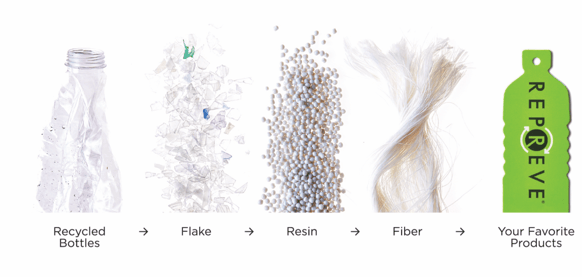Repreve-maker Unifi announced the results today of a peer-reviewed Life Cycle Analysis (LCA) about the impacts of recycled polyester on climate change versus virgin polyester.
“Repreve significantly lowers the impact of climate change and will have an immediate impact on the sustainability goals and environmental footprint of our esteemed partner brands that integrate Repreve into their products,” said Unifi CEO Eddie Ingle in a press release. “We strive to be good examples of how to design for our planet and our future, so we are thrilled to be able to help others do the same.”
Repreve is Unifi’s recycled polyester brand made from post-consumer plastic bottles and pre-consumer waste materials. It is embedded with the tracer technology FiberPrint and verified by U Trust certification. To-date, Repreve has transformed over 35 billion plastic bottles into recycled performance fibre that is used by consumer brands like Ikea, Inditex, PVH and others.
The peer-reviewed LCA quantified the environmental impacts of Repreve across a variety of impact categories in comparison to virgin polyester and verified that Repreve lowers climate change impact. A virgin polyester baseline was established for each product to align with the same geographical production as the Repreve product.
While prior LCA data focused on Repreve DTY (drawn textured yarn) produced within the United States, the new study focused on a variety of products (Repreve PC DTY, Repreve Hybrid DTY, Repreve PC Staple Fiber) and global supply chains, namely in the US, Central America, Brazil, China and an additional Asian production site.

Image: Unifi
“In the very limited cases where proxy supplier data was not available, representative datasets were utilised – in one case from Ecoinvent 3.7.1 database and in another from a published LCI. All primary and secondary datasets were modeled with Ecoinvent. The study was based on the International Organization for Standardization (ISO) 14040 and ISO 14044 and third party reviewed according to ISO 14044 following ISO 14071.”
According to the findings, Repreve significantly reduces climate impacts compared to virgin polyester, reduces greenhouse gas emissions by 42 percent and by 60 percent when compared to relative virgin staple fibre.
It also reduces abiotic depletion and fossil fuels by 66 percent (by 76 percent when compared to relative virgin staple fibre) and water scarcity by 76 percent and freshwater consumption by 67 percent.
Source: Fashionunited
